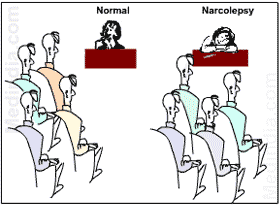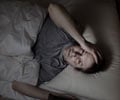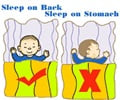- Narcolepsy - (http://www.mayoclinic.com/health/narcolepsy/ds00345)
- About Narcolepsy - (http://en.wikipedia.org/wiki/narcolepsy)
- Narcolepsy Fact Sheet - (http://www.ninds.nih.gov/disorders/narcolepsy/detail_narcolepsy.htm)
Overview
Narcolepsy - (nar.co.lep.sy) come from a Greek word – 'Narco' which means numbness and 'Plesy' meaning paralysis
Narcolepsy is a neurological
These sleep attacks occur as brief episodes and may take place even in the most stimulating circumstances, like while driving or talking to a person. Research has shown that narcoleptics are more accident-prone and may also have some difficulty with interpersonal relationships.
In addition to excessive
- Cataplexy
- Dreams
- Sleep paralysis
It is estimated to be the second leading cause for daytime sleepiness after
Narcolepsy-cataplexy was first reported by Westphal (1877) and Fisher (1878). They showed the association of muscle weakness triggered by excitement and sleepiness. The original description of the condition reads as follows:
In the case of narcoleptic individuals the brain is not able to regulate the smooth transition of the sleep wake cycles, resulting in the patients directly entering REM sleep without experiencing NREM sleep. Researchers have discovered abnormalities in parts of the brain involved in regulating REM sleep.
The majority of narcoleptic patients are still undiagnosed, and diagnosis often occurs after many years of struggle. One recent study estimated the mean number of years between the onset of symptoms and the correct diagnosis to be 14 years. As the symptoms of

"I propose to give the name of narcolepsy (from "narco" somnolence and "lepsy" seized by) to a rare neurosis or at least little known until now, characterized by a mandatory need to sleep, sudden and of short duration, that recurs at more or less close intervals."




















I heard this condition might be linked to the H1N1 vaccine, we believe my 12 year old daughter has it and it was right after she had the vaccine.